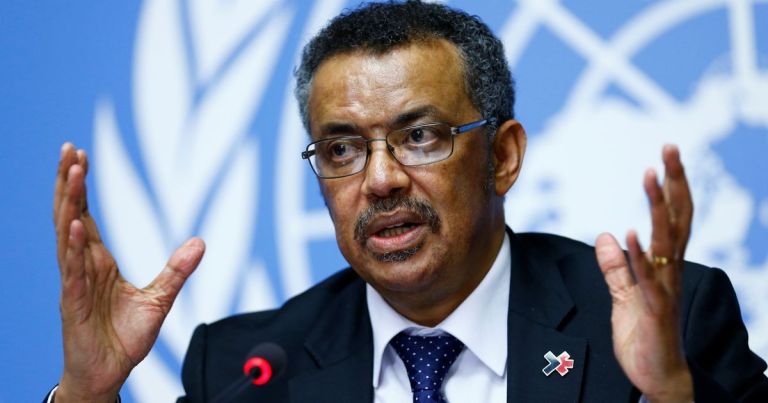The World Health Organisation (WHO), on Wednesday, defended itself against criticisms levelled at it by the United States President, Donald Trump, concerning the coronavirus pandemic.
Its director-general, Tedros Ghebreyesus, at a news conference in Geneva, Switzerland advised Mr Trump not to politicise the virus.
“Please don’t politicise this virus. It exploits the differences you have at the national level. If you want to be exploited and if you want to have many more body bags, then you do it,” he said.
“If you don’t want many more body bags, then you refrain from politicising it. My short message is: Please quarantine politicising Covid. The unity of your country will be very important to defeat this dangerous virus.”
According to CNN, the organisation’s initial response to the outbreak “has been increasingly scrutinised as global cases soar over 1 million.”
Mr Trump on Tuesday threatened to withhold the U.S. funding for the organisation only to later backtrack.
“We’re going to put a hold on money spent to the WHO,” Mr Trump said. “We will look at ending funding because you know what, they called it wrong.”
Mr Trump said he is thinking about withholding funds to the WHO, saying the international agency pushed back on his travel ban on China early in the COVID-19 outbreak.
Mr Ghebreyesus in the conference outlined a timeline of actions his organisation took in response to the crisis in the past 100 days.
He said on the January 1, just hours after WHO was notified of the first cases, it activated its Incident Management Support Team, to coordinate the response at headquarters, regional and country level.
On January 5, he said, WHO notified all member States about the new outbreak and posted news of the outbreak on its website. It followed up on January 10 by publishing a “comprehensive package of guidance” for countries on how to detect and test potential cases.
In late January, he said after the first cases of community spread were reported outside of China, the WHO “declared a public health emergency of international concern, our highest level of alarm”.
The United Nations crisis management team was activated in early February to help with the response, he added.
“We said we have been doing everything we can, but we will continue to do everything — day and night — like we have been doing to save lives. We don’t want to waste time,” he said.
He said the organisation performs an after-action assessment when confronted with a new and serious public health concern like coronavirus.
“We will do our assessment identifying the strengths and weaknesses,” he said, adding that the WHO wants to learn from the pandemic.
On January 30, the WHO said that it did not recommend any travel or trade restrictions, saying that “such measures may have a public health rationale at the beginning of the containment phase of an outbreak but that they should only be short in duration if over 24 hours because they are not very effective.”
The WHO has been criticised for relying on official Chinese government figures relating to the virus, numbers which many global officials doubt are accurate.
Also, it received criticism for a January 14 tweet noting that preliminary investigation by Chinese authorities had found no clear evidence of human-to-human transmission of the coronavirus.
The WHO’s January 30 declaration of the virus as a “public health emergency of international concern” meant that the organisation recognised that the virus posed an international threat beyond China.
This was the day after the first cases of community spread were reported outside of China and a day before Mr Trump restricted travel from China to the US.
On Tuesday, February 4, the organisation said while the virus had not yet reached pandemic levels, it was considered to be “an epidemic with multiple locations; an epidemic being more than a normal number cases of an illness.”


